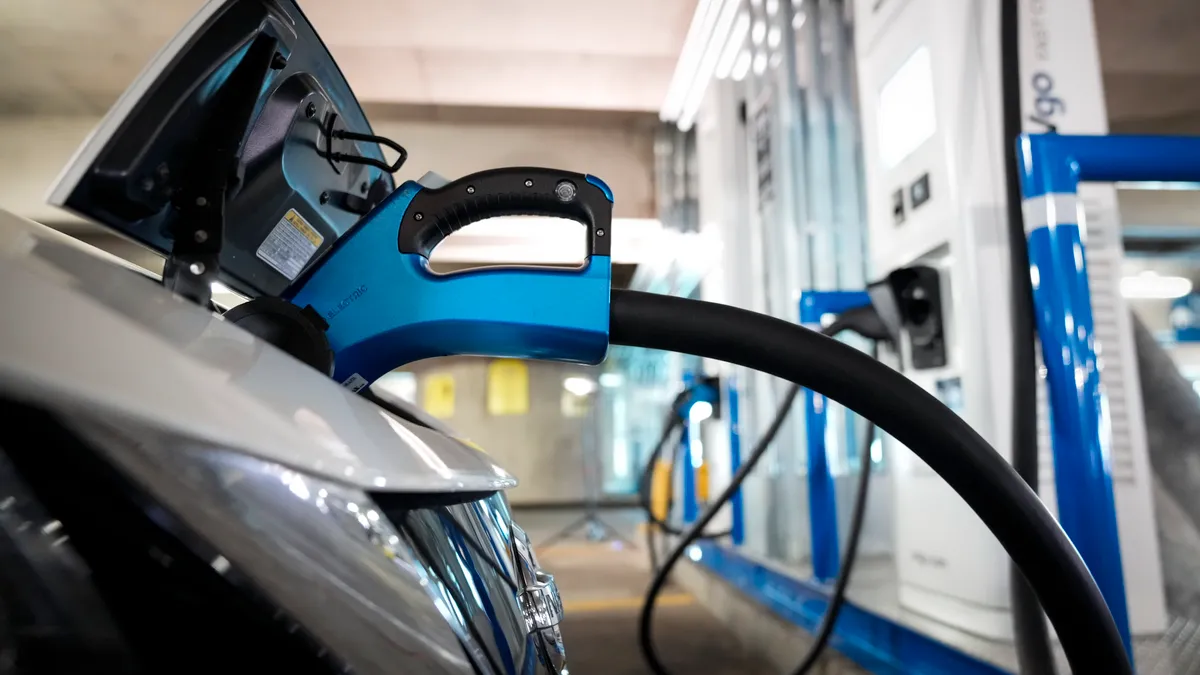The following is a contributed article by Ben Prochazka, Executive Director, Electrification Coalition; Dr. Shelley Francis, Co-Founder and Director, EVHybridNoire; Jeff Allen, Executive Director, Forth; and Joel Levin, Executive Director, Plug In America.
Electrifying the American transportation system is necessary and inevitable — the only real question is if we'll do it quickly enough. For too long, the United States has failed to commit to the policies and investments needed to foster widespread electric vehicle adoption. We need Congress to take decisive action now in support of transportation electrification to protect public health, avert the worst impacts of climate change and ensure America's competitiveness in the global auto industry.
China and Europe have charged ahead of us on electrification, wildfires are burning down communities, high rates of asthma plague Americans of all ages, and historically disadvantaged communities continue to be exposed to harmful vehicle emissions at disproportionate levels. In 2020, petroleum products still accounted for about 90% of the U.S. transportation sector's total energy use, and transportation remains the largest source of our country's greenhouse gas emissions.
The White House took important steps last month in announcing stronger vehicle emissions standards and a goal of making half of all new vehicles sold zero-emission vehicles by 2030. These actions and targets help create market certainty and demonstrate a new resolve to loosen oil's grip on the movement of goods and people. Lawmakers must now step up to the plate by allocating federal resources at levels sufficient to address the grave challenges we face.
President Biden's American Jobs Plan called for $174 billion in federal funding for electrification by 2030. Its priorities include installing 500,000 new EV chargers, electrifying school and transit buses, providing EV purchase incentives, retooling U.S. auto factories and retraining workers for the manufacturing and technician jobs of the future. However, the bipartisan infrastructure deal that passed the Senate reduces EV investments to just $13.6 billion. A proposed $15 billion investment in charging infrastructure, for instance, was whittled down to just $5 billion through the national EV program and $2.5 billion through a grants-based system — not nearly enough to install the half-million chargers the administration has called for. These types of concessions bypass a once-in-a-generation opportunity to ensure that American transportation remains competitive on the global stage.
We face serious economic risks by ceding leadership to China and Europe in EV policy support, EV manufacturing, charging infrastructure development, and supply-chain reshoring. As Congress moves through the reconciliation process, bipartisan support is vital to prepare our nation's automotive sector for inevitable global electrification. At stake are the transportation and technology jobs of the future, including the nearly 10 million jobs the auto industry currently supports.
Analysis from Securing America's Future Energy found that robust investments in electrification would yield hundreds of thousands of American jobs over the next five years. For example, a $12.5 billion investment in school bus electrification would add almost 60,000 jobs. The current version of the infrastructure bill contains just $2.5 billion. China's continued dominance in electrification would result in a severe competitive disadvantage for the United States, sending jobs, new investments and intellectual capital overseas.
Meaningful federal investments in electrification stand to benefit not only those Americans connected to the automotive industry. An accelerated transition to EVs would drastically reduce tailpipe emissions, substantially improving air quality, especially for historically marginalized communities. According to analysis by the American Lung Association, aggressive electrification would avert 6,300 premature deaths, 93,000 asthma attacks and 416,000 missed work days every year in the United States.
Robust investments in electrification are also essential to the United States' ability to protect us all from the climate crisis. As wildfires swallow entire communities in the West, hurricanes ravage the Gulf states and Eastern Seaboard, and flooding plagues the Midwest, lawmakers must acknowledge the consequences of our nation's greenhouse gas emissions. A nationwide transition to EVs, powered by an electrical grid that grows cleaner every year, is fundamental to avoiding irreversible ecological, social and political upheaval that results from climate change.
Importantly, policy efforts to accelerate transportation electrification should focus on the needs of disadvantaged communities. Existing stark inequalities demonstrate the lasting impacts that historically inequitable infrastructure systems have had on the economic and social development of many communities, especially those from underrepresented and Black, Indigenous, and People of Color groups. Policymakers must invest directly in these communities to effectively reshape the transportation ecosystem to one that is more safe, affordable, accessible and built in the United States.
We call on Congress to take immediate action to salvage American leadership in clean transportation by funding the remainder of the administration's electric vehicle and charging infrastructure proposals. Congressional leaders must address research and development, purchase incentives, charging along interstate corridors, workplace charging, and incentives to expand EV manufacturing and supply chains nationwide. We need a commitment from lawmakers to respond to the magnitude of the economic, environmental and public health challenges before us. We need policies that will put our nation in the driver's seat of the global electric transportation future.














